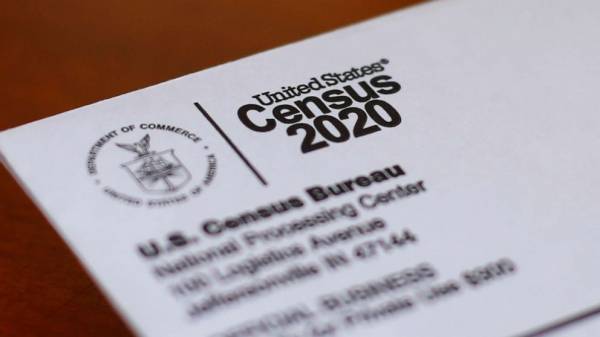
The TAKE with Rick Klein
The biggest midterm development of the week — if not the year or even the next decade — comes Thursday in a massive dump of data from the U.S. Census Bureau.
Local-level demographic results from the 2020 census, set for release around a 1 p.m. ET news conference, will set off a scramble to redraw congressional and state legislative districts that pits power against power at the state level and, inevitably, in courtrooms across the country.


Paul Sancya/AP, FILEThis April 5, 2020, file photo shows an envelope containing a 2020 census letter mailed to a U.S. resident in Detroit.
The big-picture numbers are expected to show a rapidly diversifying nation in a mostly pre-COVID snapshot; all counts are as of April 1, 2020. There’s no final guarantee that any such diversity will be reflected in representation after the state-by-state battles settle in districts and will be in place for the next 10 years.
Redistricting could even deliver a House majority.
“Republicans enter this redistricting cycle with the power to redraw 187 congressional districts to Democrats’ 75, which means redistricting could hand control of the House of Representatives back to Republicans in 2022 all by itself,” FiveThirtyEight’s Nathaniel Rakich writes.
Democrats have been warning that redistricting in just four largely GOP-controlled states that will have 94 House districts between them from 2022 through 2030 — Texas, Florida, Georgia and North Carolina — could by themselves give Republicans an unbreakable House majority, depending on how the process plays out.
With every state setting its own rules and deadlines, the process will play out in fits and starts that could interact with federal efforts around voting rights and redistricting reform.
No one can argue both sides haven’t been preparing for this moment, even if many will argue that the playing field is inherently unfair.
The RUNDOWN with Averi Harper
New York Lt. Gov. Kathy Hochul pulled no punches as she addressed reporters in her first news conference since disgraced Gov. Andrew Cuomo announced his imminent resignation.
Hochul’s stern demeanor appeared to be in direct contrast with the arrogance of pre-scandal Cuomo. The soon-to-be first female governor of the Empire State differentiated herself from Cuomo, taking the time in her remarks and in answering questions from reporters to distance herself from the executive leaving office amid sexual harassment accusations.


Hans Pennink/APNew York Lt. Gov. Kathy Hochul gives a news conference at the State Capitol, Aug. 11, 2021, in Albany, N.Y.
“I think it’s very clear that the governor and I have not been close, physically or otherwise in terms of much time,” said Hochul. “And so I’ve been traveling the state and do not spend much time in his presence or in the presence of many in the state capital.”
She pledged transparency, to dismiss any Cuomo aides involved in unethical behavior and that her administration wouldn’t be described as a “toxic work environment.” One thing Hochul shied away from delving into was if she differs from Cuomo on points of policy — the lieutenant governor walking a fine line as Cuomo holds onto his office for the next 12 days.
Despite the apparent distance between Hochul and Cuomo, Hochul insists she is ready to lead.
“It’s not something we expected or asked for, but I’m fully prepared to assume the responsibilities as the 57th governor of the state of New York,” said Hochul.
In the midst of difficult challenges, an ongoing pandemic and economic recovery, more than 20 million New Yorkers will look to Hochul for solutions while many will simultaneously be getting to know her for the first time.
The TIP with Alisa Wiersema
It’s been more than a month since the partisan stalemate in the Texas House began with Democrats breaking quorum over the GOP-backed “election integrity” bill, and tensions between the two parties only appear to be escalating.
On Tuesday, Democratic state Sen. Carol Alvarado announced she will be filibustering the version of the bill that is advancing through the Senate. The majority of her Democratic House colleagues remain away from the state Capitol, further preventing the bill’s advancement.


Manuel Balce Ceneta/AP, FILEIn this July 14, 2021, file photo, Democratic Texas State Rep. Chris Turner, left, from Grand Prairie, speaks during a news conference with other Texas Democrats in Washington, D.C.
The ongoing House standoff between the two parties also resulted in Speaker Dade Phelan authorizing 52 civil arrest warrants for the missing Democrats. The lawmakers would not face criminal charges nor would they have to pay any fines if they end up being brought back to the House chamber as part of these warrants. The move highlighted the heightened frustration among Republicans who have been attending the stalled sessions throughout the summer. In an interview with ABC News Correspondent Diane Macedo, GOP state Rep. Travis Clardy said he hopes the Democrats return voluntarily, “but if not, that’s why we have the rule (about civil arrests).”
So far, at least one member of their caucus, state Rep. Gene Wu, obtained a court order from a state district judge that temporarily protects him from being arrested. In a statement, Wu said he and his staff “are working on granting the same protection for my fellow Texas House Democrats breaking quorum.”
THE PLAYLIST
ABC News’ “Start Here” Podcast. Thursday morning’s episode features ABC News Chief Medical correspondent Dr. Jennifer Ashton, who tells us why the Food and Drug Administration is going to authorize a third COVID booster shot to some immunocompromised people. ABC News Senior Foreign correspondent Ian Pannell examines the Taliban’s advances in Afghanistan ahead of the full U.S. withdrawal. And ESPN’s Paula Lavigne explains why the NCAA punished Baylor’s football program — but not for numerous sex assault issues. http://apple.co/2HPocUL
WHAT YOU NEED TO KNOW TODAY
Comments (0)Share to FacebookShare to TwitterEmail this article

Sourse: abcnews.go.com


